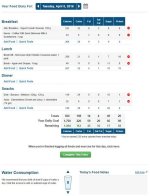The bodycoach's recipes are usually a lot higher calorie than you might expect. It doesn't matter how healthy they are, if they're high calorie then they're not particularly helpful for dieting unless you're working your other meals around them in the caloric sense or you're able to diet on fairly high calories if you're big and active.
1) Calorie deficit - this is hard to do without tracking your intake to some degree as otherwise you're shooting in the dark - MFP will help greatly although user-inputted entries can vary in accuracy.
2) Eat things you enjoy or tolerate to maintain dietary adherence, while looking to include foods that are high volume/low calorie where possible to help feel full. Little substitutions can go a long way, e.g. choosing lower calorie/smaller pizzas at the weekend (they do exist!), either replacing the snacks with lower cal alternatives or getting a higher % of your cals from protein to increase satiety and remove the urge to snack (although eating out of boredom can be a mindset thing rather than hunger).
3) Be mindful of avoiding being sedentary. Exercise is good but only makes up a small % of your total daily energy expenditure (unless you're a full time athlete), things like how much you sit v.s. stand during the day, lift v.s. stairs etc make a massive difference. Higher energy expenditure = don't have to drop calories as low to lose weight which is obviously a bonus.
4) Aim to lose between 0.5-1% of your total bodyweight a week on average (I weigh daily first thing after using the loo and get a weekly average) - this is a 'safe' rate of loss. You might lose a bit faster initially but this will just be water.
5) Patience. Most people yo-yo with their weight because they crash/fad diet which is never sustainable over the long-term. The key to sustainable loss is making it a lifestyle thing and remembering that to be a fit 12 stone guy at 5ft 6 you have to eat and move/exercise like a 12 stone guy at 5ft 6.




